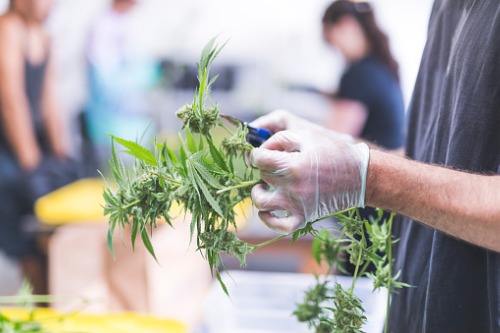

The cannabis industry has been one of the few sectors that’s thrived during the coronavirus outbreak in the United States, though the pandemic has also brought unique risks to these businesses and their employees.
Cannabis dispensaries have been designated as ‘essential’ in eight of the 11 states where adult-use is legal and, according to a CNBC report, weekly sales in March exceeded $134 million in California, Washington, Nevada, and Colorado – a 17% increase from the weekly average in 2019. Meanwhile, in the second half of the month, the average purchase increased by 47%.
“Even during these lockdowns, [these businesses] – like grocery stores – are allowed to stay open and operate, and the reason behind that is compassion [since] a lot of people are using cannabis as an alternative to opiates for pain mitigation,” said Norman Ives, broker and cannabis practice leader at NutraRisk, a division of Worldwide Facilities. “Just like any other pharmaceutical you would take for your health benefits, people need access to their cannabis if they’re using that to manage their pain.”
Nonetheless, there are also risks that businesses open during this time have encountered as they continue to deal with the public in the midst of a viral outbreak.
“Much as a grocery store worker would, you’re dealing with John Q. Public coming through your location,” said Ives, who has seen a number of dispensaries post online about putting up sneeze guards and other barriers between the customers and the areas behind the counters to create an extra degree of separation and protect their employees.
Meanwhile, staff in this industry might be taking on new or increased responsibilities that they may not have had before, such as curbside delivery. In Washington, DC, for example, the mayor signed an emergency rule allowing dispensaries to provide deliveries and curbside pickups until August 12. That means customers can place orders online, pull into a designated parking spot, and have an employee deliver goods to the car with minimal contact.
“There are some workarounds that are trying to mitigate the risks wherever possible, but obviously there would be some increased risks to those dealing with the public,” added Ives.
More broadly, the key insurance-related question cannabis businesses are posing to brokers at this time has been on business income coverage, which is (as of yet) not available for COVID-19 related losses. Moreover, cannabis businesses are already limited in terms of what’s available coverage-wise for BI and this is not likely to improve in the near-term thanks to the pandemic.
“All the forms that I’m familiar with from the various property carriers offering business interruption coverage require a qualifying loss to the building first,” said Ives. “A number of carriers are actually stopping issuing business income right now on new placements until we get on the other side of COVID-19 because there has been talk among some of the legislators about trying to require insurance companies to pay out BI losses even if they don’t qualify. Carriers are a little spooked right now in issuing that coverage and it’s probably the largest exposure a business would have in the current environment.”
However, the approach of many states to cannabis businesses during the pandemic bodes well for the future of the industry. Ives sees the handling of cannabis during this crisis as a positive sign of the progress made over the past five years.
From just two states that had legalized recreational use of cannabis five years ago, “now you’re seeing cannabis is being deemed an essential business,” said Ives, calling this significant movement. “I think that the pandemic is more proof that we’re heading towards a path [of] legalization in one way, shape, or form.”
